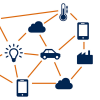Jon Hagar believes a tester should have fun, find their work challenging, and look forward to an interesting career. Some great ways to achieve this job satisfaction are to keep learning and updating your skills, develop a career plan for the future, and seek out the fun challenges in software testing.
Jon Hagar is an old retired and disrespected (because he works on things like standards and teaching) software test guy of 40 years who is really a ski bum, heavy equipment operator, but enjoys making other people think about software testing. These are all cool jobs if you can get them, but they don’t pay much.
All Stories by Jon Hagar
Many of the skills and knowledge areas that testers have in the IT, web, PC, and even mobile world will have application in the IoT. However, there are some knowledge domains that may be new or have some twists, and if testers understand them, they will be able to separate themselves from other job seekers.
Self-driving cars are the new big thing, and the operational and environment scenarios these vehicles will encounter are practically infinite. How we should develop and test these systems is a big question, and there are no easy answers. But Jon Hagar has some ideas about where to start.
The explosion of the Internet of Things means the physical world of things we use and the logical world of software testing are blending. Software testers need to become familiar with hardware, and manufacturing companies have to consider software, maybe for the first time. Everyone has new skills to learn.
As testers, we need to recognize our own biases and limitations. It is misjudgment to think that we can just close our eyes to be blind or to believe that we understand how someone with Parkinson’s disease functions. Recruit test users other than just a formal test team and learn who your users are.
Mobile apps are being developed in a time of rapid user feedback due to the prominent use of social media—which can be good or bad for those apps. Social media can make or break your product. But whichever scenario it is, testers can learn from that feedback to improve upon their test strategies.
A mobile app tester should take early actions to gain a better understanding of the product. What test verification and validation actions has the developer taken? Has the developer implemented static code-analysis testing? What risks exist for the product? Read on for more test-planning questions.








